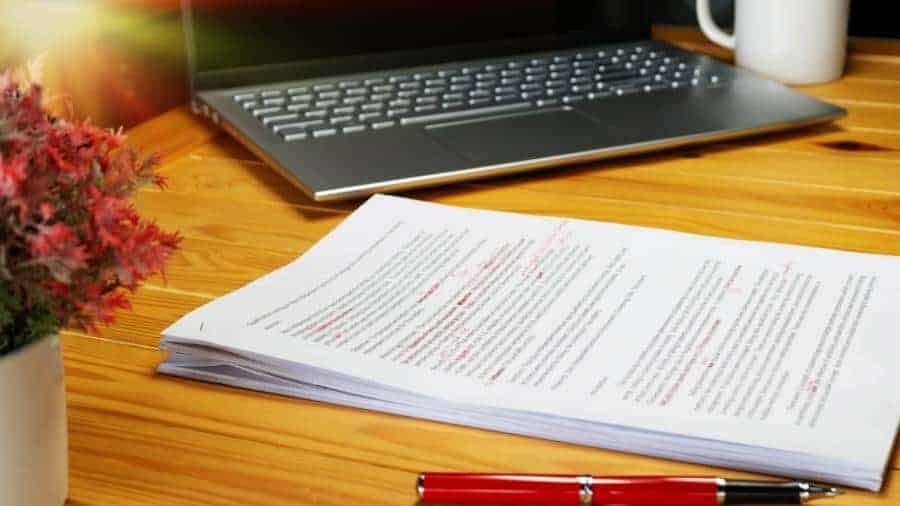This article may contain affiliate links. Please see our affiliate disclaimer in the footer menu for more information. Thank you for your support!

Are you thinking about becoming a proofreader and wondering if you’re cut out for the job? As a proofreader who knows the signs of someone who shows promise in this profession, I can help you identify if proofreading is a good fit for you.
Let’s examine some signs that indicate you’d be a good proofreader. Please keep in mind these are guidelines, and you don’t need to see yourself in every one of these indicators to be an all-star error corrector.
Signs You Would Be a Good Proofreader
1) You can concentrate for consecutive blocks of time.
If you have the concentration of an ice-skater seconds before performing a triple axel, you’d probably make a fabulous proofreader. Okay, maybe you don’t need that level of focus, but being able to pay close attention for consecutive chunks of time is crucial.
You may be proofreading a long document or have to struggle through a boring document. You may even get stuck with a long, boring document! I find most texts I proofread to be interesting. But now and then, I come across a real snoozer.
2) You relish a riveting read.
You likely find literary devices like alliteration alluring. If you’re going to be a proofreader, you’ve got to love to read. I mentioned in one of my previous posts that I’m not a fan of fiction. It’s true; it’s just not my thing.
However, I devour nonfiction. I love reading about anything in the spirituality realm and everything related to naturopathy and psychology.
So, you don’t have to love to read about everything, but you do need to enjoy reading in general. It also helps if you’re the curious type who loves to learn and is open to exploring a wide variety of subjects.
3) You tend to spot errors that others overlook.
Do you have a knack for catching errors in books or textbooks? Have you ever spotted a blunder on a restaurant menu or in a brochure? Surely you’ve found some faux pas in text messages from family members and friends!
If this is the case, you’re well suited to being a proofreader. Perhaps you were the unofficial proofreader for your friends in high school or college.
You’ve just got those eagle eyes that are always on the lookout for mistakes!
I penned a post about the types of mistakes proofreaders look for, in case you’re curious.
4) You have a strong sense of self-discipline.
Since proofreaders work alone, they need to be self-motivated. Unless you work at a publishing company or some other business, you won’t have a boss to hold you accountable for getting the job done. Instead, you’ll be responsible for staying on top of your work.
At times, you may have to light a fire under yourself or put a rocket in your pocket. I’ve certainly had to light a fire under my, um, self a time or two. 😉
5) You pay attention to details.
“Pay attention to the little things. They’re more important than you think.”
– Matt Gutierrez
If you think this quote is apropos for proofreading and appreciate the correct use of they’re vs. their vs. there, you’d probably be a good proofreader. You like to get down to the details.

Instead of being the editor who focuses on the big picture, you prefer to deal with the finer points. You’d likely notice if a sentence was missing a period or if the spacing between paragraphs was a bit wonky. And as we know, the devil is in the details.
6) You can think for yourself.
Since proofreading is done solo, you’ll need to be able to make your own decisions. Does that hyphen belong there, or should you nix it? You’ll have to do research to figure things out for yourself. You need to trust your judgment and come to your own conclusions.
Sure, you can always turn to your colleagues for help (and vice versa), but for the most part, it’s all you. If this sounds intimidating—don’t fret! You’ll gain confidence after you’re equipped with the proper skills.
7) You like to be organized.
At least when it comes to working, you’re on board with being organized. Keeping track of projects and deadlines is an essential part of a proofreader’s job—they often have more than one project on the docket.
They also may be working on a long-term job while juggling a few other short-term assignments, and they often deal with time-sensitive materials. Staying well organized and prioritizing tasks is a must.
8) You enjoy your own company.
As a proofreader, I enjoy collaborating with me, myself, and I. No one else is involved. If you don’t mind working by yourself, you’re all set. If you do mind a bit, then what about simply being around other people?
Instead of working at my house, I do a lot of my work at a local Barnes & Noble café so I don’t feel too lonely. It works wonders for me. Maybe it could work for you also. 😊
9) You have a broad knowledge base that’s always expanding.
Where did all that knowledge come from? Maybe it came from higher education, or perhaps it’s because you’re well read.
Having well-rounded knowledge will behoove you when you’re eradicating errors: it’s easier to proofread texts you understand.
One of the perks of proofreading is learning on the job. So far, I’ve enjoyed expanding my knowledge about numerous subjects—even a few I initially thought I wouldn’t be especially interested in.
10) You’re comfortable with continuing education.

Language is constantly evolving, so proofreaders need to evolve with it. The Chicago Manual of Style—a common style guide for US English—is currently in its 18th edition. It gets updated periodically to reflect shifts in language.
New words are continuously added to the dictionary. For example, zedonk and zonkey were added to the Merriam-Webster Online Dictionary in April 2020. If you think a zonkey is a cross between a zebra and a donkey, you are correct!
11) You’d proudly serve on the grammar police force if one existed.
You feel it’s you’re your civic duty to snuff out spelling slipups, correct capitalization catastrophes, fix formatting flubs, put a stop to punctuation pitfalls, and get rid of grammatical gaffes.
You’re keenly aware of the difference between it’s and its and would love for everyone else to be mindful of these distinctions as well.
You feel like the misuse of homophones should constitute some sort of infraction, right? 😉
What would be the consequence if a writer made a mistake dealing with homophones while you were on grammar patrol? Maybe a warning? Whoa! That’s far too lenient.
A stiff fine? Yes—that sounds much more reasonable! After all, the punishment should fit the crime.
Okay, so I may be exaggerating, but you know what I mean. 😊
12) You’re more concerned with grammar and mechanics than most.

You probably wouldn’t want to leave an i undotted or a t uncrossed.
Do you try to punctuate your text messages properly, or at least ensure autocorrect hasn’t given them an unintended meaning?
When I taught young children in Costa Rica, I wrote a monthly newsletter for my students’ parents. One month, outer space was going to be our theme for the next two months. A sentence in my newsletter contained the word earth, and I wasn’t sure if earth should be capitalized in that context.
I doubt the parents ever scrutinized my writing in those letters.
Plus, except for the parents of a few children from the United States, most of the children’s parents didn’t speak English as a first language. Impressively, most of them spoke English fluently, but would they be aware of such a minute detail? Probably not.
Even though no one would care (or probably even notice) if I correctly capitalized the word, I took the time to find the right answer. I guess I did that for my edification.
I think that was a pretty clear sign that being a proofreader was right up my alley.
Do you also tend to write carefully, more for yourself than anyone else?
13) You know that spelling is significant, punctuation is powerful, and grammar is a game-changer.
You’re aware that a seemingly itty-bitty mistake in spelling, punctuation, or grammar can change the meaning of a sentence.
Here’s an example of a spelling snafu: Would you like to have a tasty desert after dinner?
Hmm, I think you would prefer a delicious dessert over a tasty desert!
And you may have seen this meme on social media that demonstrates the consequences of a lack of punctuation precision:
“If you don’t think punctuation is important, try forgetting the comma when you tell someone ‘I’m sorry, I love you.’”
– Jamie Capria
Finally, this is an example of a grammar goof caused by a misplaced modifier: The teacher gave the tests to the children that had been graded. Wait. Did the teacher grade the tests or the children?
If you’re interested in learning about some real-life language lapses that had significant monetary consequences, feel free to watch the YouTube video below.
I hope this article helped you decide if proofreading is a good fit for you!
If you’d like to explore this topic further, you may enjoy reading my article “20 Pros and Cons of Being a Proofreader.”
A Related Question
Is proofreading a skill?
Some people wonder if proofreading is a skill that needs to be learned or if they can dive right into being a proofreader if they already have a solid grasp of the English language (or whatever language they’ll be proofreading in). Being a proofreader requires more than knowledge of grammar and mechanics.
Proofreading is a skill that is developed with specialized training and practice. Proofreaders learn extensively about grammar, capitalization, punctuation, and spelling. They also develop relevant research and computer skills and learn about one or more major style guides.
If you’d like to learn about training options, I encourage you to read my article about the best online proofreading classes.
Proofreaders also need other skills that are just as important but often overlooked. For comprehensive information about the skills required to become a proofreader, please see my post “19 Must-Have Skills to Be a Proofreader.”
Best wishes to you!
“What lies behind us and what lies before us are tiny matters compared to what lies within us.”
-Ralph Waldo Emerson

Recent Posts
Punctuation is important because it enables us to communicate our message clearly and effectively. Without punctuation, we wouldn’t understand how units of a sentence relate to one another or how...
Although you're probably somewhat familiar with adverbs, you may be unaware of sentence adverbs. As a trained proofreader who has studied the parts of speech, I can help you understand this unique...
